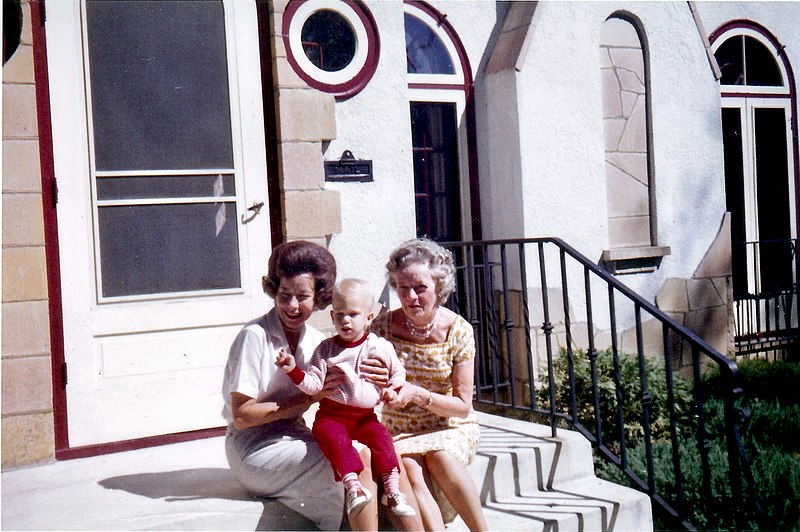Times of crisis, injustice, and division seem to define our moment. But they are actually defining features of the human experience. The human condition is the same in all times and places. We’re profoundly social as a species, but we’re also defined by self-love—and the tension between these facets of our nature ensure that injustice and chaos will always be part of our lived experience this side of eternity.
It’s easy to despair.
I certainly did. I experienced a season of division in Washington D.C. while working at our nation’s capital. I chose to give up, to flee.
I moved with my husband to Indianapolis, Indiana—a city in his home state that I hoped would be free from the polarities of extreme politeness and extreme hostility that I experienced while working in federal government.
While there, I discovered a quiet revolution afoot that is healing our world from the bottom up, one interaction at a time. I first encountered this revolution through an unexpected invitation.
“I’m Joanna Taft,” said the tall, socially fearless woman with a blond bobbed haircut and ready smile. She immediately reminded me of my mother, in more ways than one. “Would you like to porch with us sometime?” she asked, as we chatted after church one August afternoon.
This marked the first time I had heard the word “porch” used as a verb.
For Joanna, “porching” is about reviving the community living room. The porch is a quasi-public “third place,” a neutral ground where people from different backgrounds can encounter and befriend one another. In a seminal essay for the Palimpsest, Richard H. Thomas documents how between 1860 and 1960, Americans gradually changed the architectural arrangement of their homes: porches moved from the front of the home to the back, becoming the modern patio. Thomas argued that the home is a personal and cultural statement about the way a society and culture is organized and oriented, and that this architectural shift—from front porch to back patio—tracked a social one: a move from the communal to the individual, from a focus on public life to a preference for the private.
Though originally from the Washington, DC, area, Joanna chose to build a life in Indianapolis with her husband and family. She has used her porch to cultivate community and to provide a haven from the hurriedness of modern life. It is a place to forge new friendships, an incubator of ideas to make the community brighter, a place to encounter and create beauty, a catalyst for further cultural and communal growth, and a venue where those who differ politically, racially, and culturally can form bonds and feel seen, known, and loved.
My husband and I joined Joanna on her porch that afternoon, a decision that would deepen my understanding of the practical benefits of civility. Much as I’d seen my mother do with countless others whom we had welcomed into our home growing up, Joanna asked us about our backgrounds, interests, and passions so that she could effectively introduce us to others and plug us into the community. Joanna’s emotional and practical hospitality helped us discover and define our niche in our new community. Her civility—and the community it built—helped make Indianapolis feel like home.
We live in fractured days, lacking in harmony, civility, and comity. “Comity,” an old word for courtesy and kindness, is related etymologically to the Sanskrit word for “smile.” As it often does, etymology here beautifully illuminates a reality, in this case about both kindness and smiling: they unceasingly bring warmth, joy, and a smile to both giver and receiver. I realized that the civility of Joanna’s front porch, as a place of joy and laughter, was a breeding ground of comity, a much-needed refuge from the broken state of our world.
In this way, Joanna’s porch and other spaces like it are essential building blocks of civil society—and in turn, contribute to human flourishing.
Other people across history and culture have similarly realized the power that lies in reclaiming their civic and social sphere, and choosing to be part of the solutions themselves in the face of chaos and injustice. Albert Schweitzer and the Chinese Sage Confucius are just a few.
“Everyone must find their own Lambaréné”: Lessons from Albert Schweitzer
Alsatian-German doctor, theologian, philosopher, and Nobel laureate Albert Schweitzer spent over two decades reflecting on the nature of true civilization. As a young man, Schweitzer’s conscience was sensitized by the plight of colonial Africa. Horrified by the brutality of colonial powers toward the people of Africa and the European occupiers’ cavalier disregard of human life, he emerged as one of the twentieth century’s harshest critics of colonialism. He saw the transparent self-interest and imperialism that motivated European colonial powers, disguised beneath the name of spreading “civilization” to other nations. Schweitzer wrote,
Oh, this “noble” culture of ours! It speaks so piously of human dignity and human rights and then disregards this dignity and these rights of countless millions and treads them underfoot, only because they live overseas or because their skins are of different color or because they cannot help themselves. This culture does not know how hollow and miserable and full of glib talk it is, how common it looks to those who follow it across the seas and see what it has done there, and this culture has no right to speak of personal dignity and human rights.
He saw the Western world’s hypocrisy: its claims to support human rights and dignity rang hollow in the face of its ruthless colonial legacy. Schweitzer wanted to change the way the world understood civilization and how it viewed humanity. He decided to start with himself. “My life is my argument,” he was fond of saying.
In 1913, Schweitzer opened a hospital in Lambaréné, a small town in what was then a part of French Equatorial Africa and what is today the West African country of Gabon. Immediately upon its opening, thousands of people traveled hundreds of miles to reach the hospital and seek much-needed medical care. When World War I broke out in 1914, Schweitzer and his wife, Helene, were German citizens in French-occupied territory and were placed under supervision by French authorities. During that time, they were able to continue their work serving Africans in need of medical care. In 1917, they were sent to internment camps in France, from which they were released in 1918.
After his release, Schweitzer processed his years of instability and tumult by writing about his experience in Africa. He wrote about the barbarity of colonialism, exposing the sham of this atrocity committed in the name of “civilization.” He offered an account of true civilization in his book The Philosophy of Civilization. In this work, Schweitzer said that there were two definitions of civilization: the material and the ethical. The material view defined civilization solely according to its creative, artistic, technological, cultural, and other material attainments—in other words, the sort of superficial attributes that Saddam Hussein thought defined civilization. For Schweitzer, the material view was false civilization. He favored the ethical definition as true civilization, which he defined as a “mental attitude” premised on “reverence for life”—a phrase he coined for the view that saw human life, and all life in general, as intrinsically valuable. As Schweitzer wrote, “Reverence for Life affords me my fundamental principle of morality, namely, that good consists in maintaining, assisting, and enhancing life, and to destroy, to harm, or to hinder life is evil.”
In an argument similar to Martin Luther King, Jr.’s, Schweitzer said that to perpetuate and foster life is an unalloyed good; to degrade it is an unalloyed evil. Individuals in a society must adopt a weltanschauung—a “theory of the universe,” or worldview—that respects personhood and the intrinsic dignity of the human being in order to form a true civilization. Reclaiming a high view of personhood begins with appreciating the capability and potential within each of us. After that, Schweitzer says, we become inspired to realize our potential in ways that benefit our fellow human beings and the world around us and bring about social, cultural, and scientific advancements.
In other words, the things that lead to achievements in culture, technology, and infrastructure are byproducts of a society that values the intrinsic worth of human life. On their own, however, such byproducts do not make a true civilization, one that values the dignity of the person and nurtures his or her potential, makes it. Once a society has lost its reverence for life—once it has come to see its value as a civilization in purely material terms, and degraded the personhood of its own citizens or other groups—it begins to decay. Only a vigilant commitment to a reverence for life can prevent civilization from descending into barbarism and chaos, Schweitzer argued.
But how can one begin the process of transforming a society from a faux civilization into a true civilization? Schweitzer, like Joanna, realized he couldn’t single-handedly transform society.
He understood that big, heady concepts such as civilization are intimidating and abstract but that everyone has a role to play in preserving and improving these values.
“Everyone must find their own Lambaréné,” Schweitzer asserted. Everyone has their own sphere where they can practice a reverence for life, esteeming and preserving its intrinsic beauty in all of its forms. Each one of us has a humble role to play in defending against inhumanity, cruelty, and barbarism, and in reviving true civilization.
Confucius: The Politician the Wasn’t
British mathematician and philosopher Alfred North Whitehead noted that the “European philosophical tradition consists of a series of footnotes to Plato.” Many have said that the same is true of Confucius in the Chinese philosophical tradition: the entire history of Chinese literature—plays, novels, and more—is a series of footnotes to Confucius and the Analects. His philosophical and ethical ideas have formed the basis of East Asian culture and society.
We know little about the historical Confucius beyond the fact that he led a professionally frustrated life. He yearned to have political influence during his lifetime. He hungered to see his teachings adopted from the top of society down so that they could help people. He had a “trickle down” theory of social change that began with cultivating the character of leaders: elites with integrity would naturally work toward the benefit of all people. He spent over a decade traveling across China trying to convert rulers to his ideas and persuade them to adopt him as an adviser.
When he failed to do so, Confucius was at first discouraged that he was not able to put his ideas into practice. But he returned to his home of Lu, south of Beijing, and resolved to do what he could with the rest of his life to bring about positive social reforms. He spent the remainder of his life talking with his disciples and teaching his local community his vision of an ethical and humane world.
Confucius didn’t let his failure to be a political influence in his lifetime stop him. He focused on what he could control, and he chose to make himself and those around him better and stronger.
And he had more influence than he would ever have guessed during his lifetime.
Confucius would not live to see the effect his ideas would have on government leaders. For many years, the entrance exam to become a government official in China was to memorize the entirety of the Analects! For Confucius, known simply as “the sage” throughout Chinese history, the best life was the social life, and the social life required developing a demeanor of kindness and benevolence toward others. We find in Confucius’s Analects—a collection of dialogues, maxims, stories, and aphorisms thought to have been compiled by his students—that the virtue and kindness of one person can elevate and improve the lives of those around him or her—and society, too.
Confucius knew that we live in an incredibly complex and social world where roles and duties change all the time. Instead of giving people principles to memorize, he wanted to give them guidelines to live by and to help them navigate the often ambiguous and fluid project of life in community. He understood that changing our disposition toward others was more effective than memorizing a list of rules and would more reliably cultivate a shared effort to elevate social life and improve civility in society.
Lessons from the Original Porch
In 176 AD, Roman emperor Marcus Aurelius, known to history as a “philosopher king,” endowed four chairs of philosophy in the city of Athens. For the Epicureans, he endowed the Garden. For the Platonists, the Academy. For the Aristotelians, the Lyceum.
And for the Stoics, the Porch—or the Stoa.
The Stoics’ porch was located at the ancient Agora, which for many years had been home to a variety of famous philosophical schools. And for the Stoics the porch represented an important idea: we can each realize our capacity for true freedom and flourishing when we choose to distinguish what we can control from what we can’t and decide to make the best of what is in our control.
The stoicism of Marcus Aurelius and that of his intellectual mentor, Epictetus, offers lessons in how to create a more civil future. In short, it starts with us. We can’t change society, but we can change ourselves and how we operate in the world around us. And if enough of us decide to change ourselves, we might be able to change the world we live in, too.
Epictetus was a slave and referred to himself as a cripple. Despite his disability and his lack of the political freedoms that many of us enjoy, he made the most of his circumstances and ultimately became one of the most important philosophers in history.
Unlike Epictetus, Marcus Aurelius was born to freedom, privilege, and wealth. Yet as Roman emperor during a time of constant war and plague, he had his own struggles to bear. Like his teacher Epictetus before him, however, Marcus Aurelius strove to focus only on what he could control. He endeavored to treat those around him justly and to live a life of personal virtue.
It’s easy to look around us at the divided state of the world and blame our public leaders, the media, our education system, and more. But that’s not a productive way to spend our time.
Instead, we should focus on what we can control.
Us.
The Stoic porch of Marcus Aurelius and Epictetus illuminates how each of us can do our part to restore civility to modern life. These philosophers remind us that change in society begins with ourselves. This chapter opened with my story of moving to Indianapolis after a frustrating season in Washington, DC. Soon after arriving, I saw how Joanna Taft sows seeds of friendship and community wherever she goes. She spreads and cultivates the garden of civilization in her wake by focusing on nurturing the individuals—the raw plots of soil—she encounters. The seeds she’s sown have already flourished and been fruitful in her lifetime and will continue to do so after it. She is a serial builder of social capital and a deployer of the timeless principles of civility, tools she uses to create new institutions to make her community better.
Joanna’s front porch—her stoa—is central to the relationships she forms and the institutions that she helps build. Like the Stoics, she focuses on controlling what she can and on making the world around her better. In doing so, she embodies the ethos of the Stoic philosophers—the original “porchers.”
The attitude of Stoic “porchers” shows how the disposition of civility is one we can all have anywhere, anytime—with a porch or without one. Anyone can be a part of healing their family life, their community, and even the world, one relationship, and one interaction, at a time.
Cultivating the disposition of civility in our personal garden—and the attitude of porching—means meeting people at a human level, cutting through tribes and superficial labels. Civility will enable us to build meaningful human connections whenever and wherever we can. This can take many forms, such as welcoming people into our home, initiating a conversation across political divides, or offering a simple smile and acknowledgment to a stranger on the street. We must resist the temptation to look around at the divided state of our world and feel stuck and helpless. Marcus Aurelius and Epictetus remind us that focusing on what we can do is the answer. And in truth, we can do a lot.
Our interactions with others can leave people better off, and restore faith and trust in society. These strengthened, trust-infused relationships, in turn, strengthen neighborhoods, cities, and countries.
The Joannas of the world are good stewards of the garden of civilization. They build and bind our social fabric. They lead their civility-rich lives to bridge divides and sow seeds of trust. We can choose to lead such lives, too.
In doing so, we can be part of healing the personal and social hurt caused by our tribal, toxic status quo and of moderating the excesses of hostility and atomization and destructive politeness that define our public life today. In choosing to embody civility, we each have the chance to promote individual flourishing, civil society, and our free and democratic way of life.
As Joanna Taft, Porcher-in-chief, is fond of saying, “It’s not about having a porch. It is a lifestyle.”
We can each respond to the chaos, barbarism, and injustice in our world by learning from “porchers” across time and place, re-locating our center of control, and being part of the antidote to barbaric times in our everyday lives.
This essay is adapted from Alexandra O. Hudson’s recent book The Soul of Civility.
Image credit: via Wikimedia Commons







2 comments
Martin
A concisely developed bridge between East and West, thank you Alexandra.
I’d heard that the civil service exam in China required memorization because the Analects were understood as describing the totality of human interactions: if you knew the alphabet so to speak, you could create words to fit any new situation. OTOH, others have pointed out that the memorization itself become dominant, almost robotic in its rigidity.
I notice that this short excerpt includes the word “control” 7 times. Perhaps that is the key to understanding the criticism given to Confucius by Lao Tzu during their apocryphal encounter. After Confucius expounded on his theory of humanism and justice, Lao Tzu allegedly responded, “What you, sir, have spoken of today is like a footprint. That which made the footprint has gone, and how, alas, can the print be taken for the foot?”
Chapter 18 of the Tao Teh Ching summarizes the distinction, and perhaps is the basis for the supposed encounter: when the spirit is lost, moral principles are enunciated; when you have to teach people filial piety, that means they have already lost their natural inclination to respect their parents.
Brian D Miller
A helpful post-Thanksgiving Day piece to read. I’m currently reading this book each morning. And find myself engaged by the topic, with pencil in hand.
Certainly, it is a timely work, not only before the elections next year, but for this moment we find ourselves.
It is surely not unintentional by the author that some of the optimism I’m feeling from reading this book is that our current state of incivility is nothing new.
Now I just hope I can remember some of the lessons before I open my mouth.
Comments are closed.